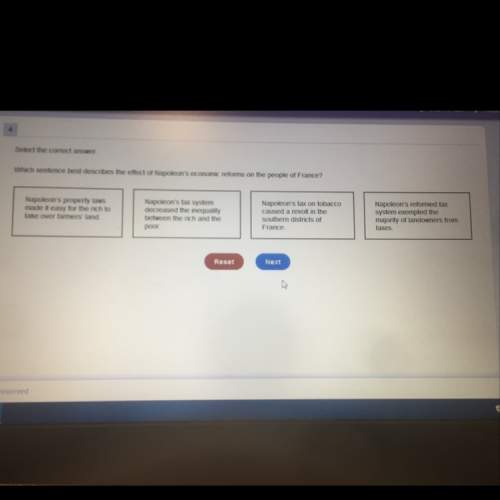
History, 01.10.2019 04:30 genesisdiaz1352
In many states, the governor has the power to reject certain parts of legislation that he does not like, while not rejecting an entire bill. this power is known as veto.

Answers: 1


Another question on History

History, 21.06.2019 17:00
The practice of selective incorporation means that the bill of rights will
Answers: 2

History, 21.06.2019 18:00
What clause(s) expanded the power of the executive branch, especially relating to foreign policy?
Answers: 2

History, 21.06.2019 20:00
Background information: this is an article by will irvin, a correspondent for the new york tribune. irvin wrote this piece in april 1915, while reporting from the western front. at the time that irvin wrote this piece, the united states had declared neutrality in the war. boulogne, april 25. – the gaseous vapor which the germans used against the french divisions near ypres last thursday, contrary to the rules of the hague convention, introduces a new element into warfare. the attack of last thursday evening was preceded by the rising of a cloud of vapor, greenish gray and iridescent. that vapor settled to the ground like a swamp mist and drifted toward the french trenches on a brisk wind. its effect on the french was a violent nausea and faintness, followed by an utter collapse. it is believed that the germans, who charged in behind the vapor, met no resistance at all, the french at their front being virtually paralyzed. the effect of the noxious trench gas seems to be slow in wearing away. the men come out of their nausea in a state of utter collapse. some of the rescued have already died from the after effects. how many of the men left unconscious in the trenches when the french broke died from the fumes it is impossible to say, since those trenches were at once occupied by the germans. –will irvin, 1915 what were the effects of the poison gas, according to the reporter? a.) the french were victorious over the germans. b.) soldiers suffered from nausea and began to pass out, while some even died. c.) there were few effects, and the battle continued. d.) the gas was yellow and caused the men’s skin to blister.
Answers: 1

History, 21.06.2019 20:30
The idea of liberalism in eighteenth-century british politics: a. had mainly a civic and social quality. b. prompted two eighteenth-century leaders, joseph mccarthy and hugh mccarran, to demand independence for ireland. c. brought great wealth and power to its main voice, john locke. d. was compatible with inequalities in wealth and well-being. e. had the same meaning as liberalism in twenty-first-century american politics.
Answers: 3
You know the right answer?
In many states, the governor has the power to reject certain parts of legislation that he does not l...
Questions


English, 05.08.2021 19:40

Mathematics, 05.08.2021 19:40

Computers and Technology, 05.08.2021 19:40

History, 05.08.2021 19:40


Chemistry, 05.08.2021 19:40


Mathematics, 05.08.2021 19:40


Physics, 05.08.2021 19:40


Health, 05.08.2021 19:40


Biology, 05.08.2021 19:40



Mathematics, 05.08.2021 19:40


Mathematics, 05.08.2021 19:40




